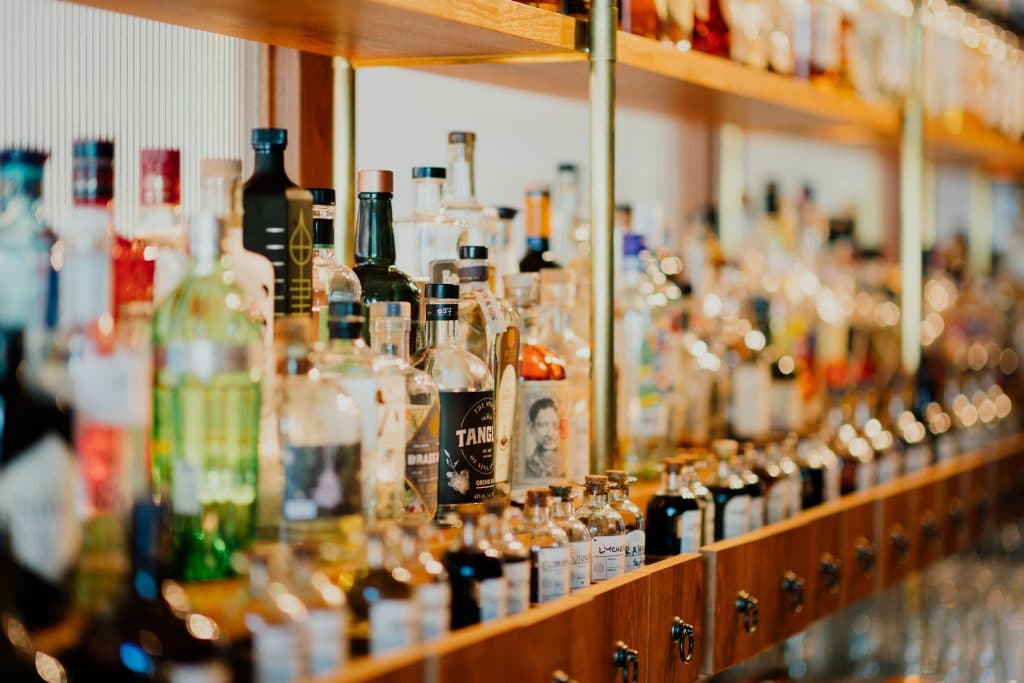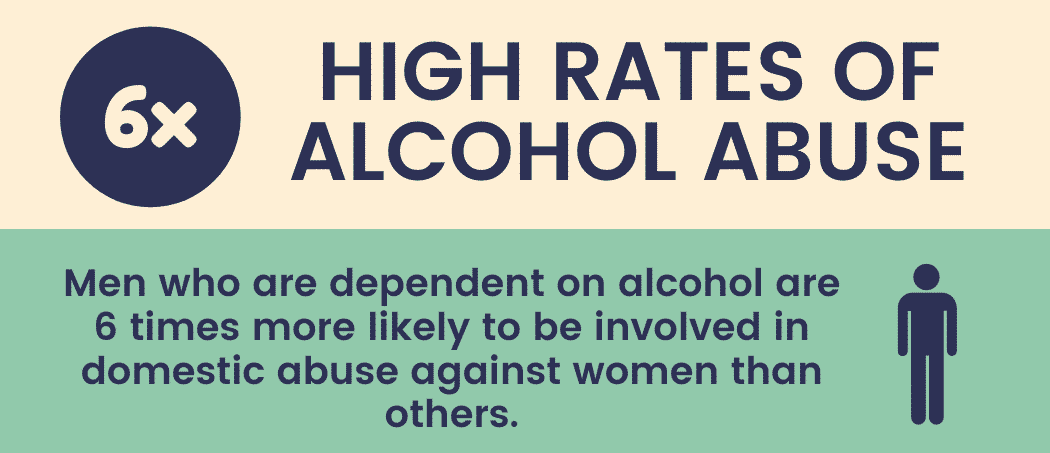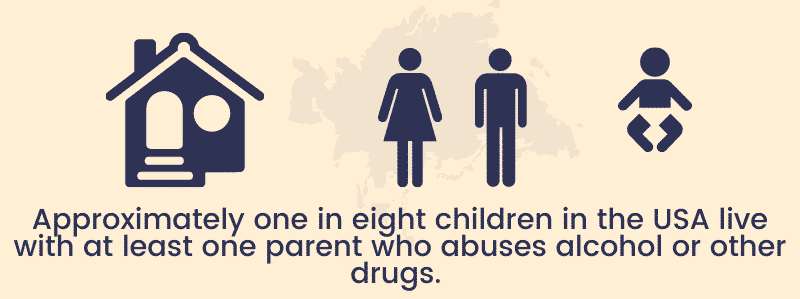Alcoholism and Domestic Abuse
Table of Contents
Alcoholism & Domestic Abuse Are Two Issues That Often Go Hand In Hand.
First anger, resentment and verbal abuse set the simmering tone for an unhealthy relationship. Then, alcohol is poured on the flames causing tempers to flare and self control to disappear. Drunk partners lash out at their family members, causing severe emotional and physical hurt.

Although domestic abuse is not directly caused by alcohol abuse, it can certainly be fueled by intoxication. Someone who might otherwise be able to control their violent urges may be more likely to lash out violently when they are intoxicated.
On this resource page, we’ll delve into the connection between alcoholism and domestic abuse. We’ll offer information on how alcohol can exacerbate violence in abusive relationships and what you can do to find help.
What is Domestic Abuse?
When most people hear the words “domestic abuse” – they likely imagine someone hitting their partner. However, domestic abuse (also known as intimate partner violence) is much more complicated than that.
In addition to physical violence, domestic abuse also includes behaviors that control, manipulate or emotionally hurt the victim. This can include threats and intimidation, exerting financial control, isolating the victim from their friends and family and much more. Often these psychological manipulations are occurring at the same time as the physical violence.
It doesn’t discriminate. It can happen in any relationship regardless of sexual orientation, religion, gender, race or age. It occurs in relationships of all economic backgrounds, education levels and nationalities.
Men can be victims of domestic violence. Also, they may feel unsure about asking for help, because they are worried about seeming “weak” for being abused by their partner.
Many abusive partners seem perfectly fine at the beginning of the relationship. Their possessive and controlling behaviors may emerge and intensify as the relationship grows.
Domestic violence looks different in every relationship. Even if the abuse in your relationship is verbal and emotional rather than physical, it is still serious. No one deserves to experience abuse of any kind.

This study was conducted by the University of Oxford and involved experts from King’s College, London as well as the USA and Sweden. It tracked 140,000 men who had been clinically diagnosed with a drinking or drug problem between January 1998 and December 2013.
The study looked into whether the participants had later been arrested for attacking, threatening or sexually assaulting their partners. They found that 1.7% of men who were dependent on alcohol were subsequently arrested for these types of offences. This is six times higher than the overall national average of men with a similar age profile.
Other Alcohol-Related Crimes
In additional to intimate partner violence or spousal abuse, an alcohol problem can lead to a number of crimes that cause pain and suffering to the families of the addicted person. An estimated 55% of people who commit domestic abuse were drinking. 3
Here are some examples of the most common alcohol-related crimes:
Child Abuse

Sexual Assault
Again, since alcohol consumption is linked to an increase in aggression and a loss of inhibition, it should come as no surprise that it also aggravates the risk of sexual assault. Drinking won’t cause someone to sexually assault someone else, but it might heighten their aggression and remove their inhibitions.
Whether the situation involves sexual assault against an intimate partner, another family member, an acquaintance or a stranger, alcohol consumption will almost always make the problem worse.
DUI
When faced with the decision of whether to drive home or pay for a taxi, the intoxicated person might decide to take the risk. They will justify it to themselves, saying they are “not that drunk” and it’s “only a short drive.”
However, alcohol lowers reaction time, coordination, concentration, vision and judgement. Driving under the influence of alcohol is always dangerous no matter how much someone tries to justify it.
How Alcohol Contributes to Domestic Abuse
It’s important to keep in mind that alcohol does not cause domestic abuse. Most people can enjoy the occasional drink and will never hurt their partners or their families. Drinking alcohol will never be a sole trigger for anyone to abuse their partner.
Also, when people are under the influence of alcohol they may perceive a situation differently. So, a normal response from a partner or a child may cause the person to feel attacked or provoked, which could lead them to lash out in anger.
While reclaiming their sobriety may help the person reduce the amount of violent outbursts, it won’t necessarily solve the main issue. Domestic abuse is an issue in itself and it needs to be addressed and treated alongside the alcohol addiction. Often therapy is needed to address the underlying emotional issues associated with the problem.
Alcohol Addiction in Victims of Domestic Violence
Alcohol initially makes you feel less stressed by slowing down your heart rate and blood pressure and lowering your body temperature. It can therefore temporarily relieve stress and can offer some self-medicating effects.
However, drinking excessively on a regular basis can cause a chemical imbalance in the brain, which leads to alcohol addiction.
This is a downward cycle, which can result in further drinking to try to cope with the problem. When the victim does extract themselves from their abusive situation, they will also need to do the difficult work of letting go of their reliance on alcohol – which is certainly not easy.
Denial and Rationalization
One of the common issues tied into alcoholism and domestic abuse is that it is incredibly difficult for the abusive person to admit they have a problem. They need to believe themselves to be innocent and right, in order to preserve their sense of power.
It is common for an abuser to shift blame over to the victim, claiming that they were “asking for it.” This is otherwise known as “rationalization” – a form of self-deception that shields the abuser from the true horror of what they are doing.
The abuser will construct a narrative that makes the victim responsible for “setting them off” and “making them do it” – therefore refusing to take responsibility for their own actions. They will also use these rationalizations concerning alcohol – such as “she makes me so mad I need to have a drink.”
When such an outburst happens, they will take the blame and make apologies for their abuser – accepting the idea that they deserved the abuse. Additionally, victim blaming makes survivors afraid to speak out about the abuse. They will fear being shamed and judged – or perhaps not even believed.
Finding Help for Domestic Abuse

Also, when the victim eventually does leave – the abuser will likely become angry and is likely to lash out. The severity of this outburst will often become even worse if alcohol is involved.
Remember that the abuse is not your fault. You deserve to live without fear and be treated with respect. You have a right to a safe and happy life, for yourself and your children. There are many people waiting to help and you are not alone.
- Try to gather any evidence you can of your partner abusing you. This includes threatening messages, copies of police reports, photos of injuries or photos of any damage to your property.
- Contact your local domestic abuse support center. They will have resources in place to help you escape from a dangerous situation and they will be able to tell you exactly what steps to take.
- If your abusive partner has control of your finances, consider creating a separate bank account or asking a friend to hold onto cash for you - so that you’ll have an accessible stash if you choose to leave.
- Be ready to leave at a moment’s notice. Have emergency clothing, cash, documents and other essentials stashed in a safe place, such as at a friend’s house. If you can, hide another set of car keys so you can drive away even if your partner takes them away from you.
- Ask your doctor to help you stock up on extra medicine, hearing aids, glasses or other medically necessary items for you and your children.
- You can also keep an alternate cell phone nearby. This will allow you to call for help, even if your partner is tracing your number. Write down the numbers of your close family and friends so you can call them even if your partner takes your phone.
- Come up with a code word or phrase you can say or text to your friends and family members to let them know you are in danger and need them to call the police.
- You may even want to contact your local family court, as they will be able to help you get legal help or a restraining order if you need it.
- Protect your online security and change your passwords so your abuser can’t log into your accounts. You may want to use a computer at a public library or at a friend’s house, so your partner is not able to look at your search history and track your planning.
Finding Help for Alcohol Addiction

If you are seeking out help for your abusive partner who is struggling with an alcohol addiction, it won’t be an easy road. Of course, you may love your partner and want to help them – even though they have hurt you. However, denial and rationalization will make it difficult for them to admit they have a problem.
If your partner is struggling with alcohol addiction, you can support them and help them get the treatment they need. However, it’s important to remember that the only one who can decide to seek help and overcome an addition is your partner. You can’t force them into recovery – they have to make that decision for themselves.
Some people are able to quit drinking or reduce their drinking to safe levels with the help of a 12 step program or a support group. Other people may need medical supervision to withdraw from alcohol safely. The option that is best will depend on how much they have been drinking, how long they have had a problem, the living situation and any other health issues they might have.
Here are some important things to remember when seeking help for someone with an alcohol addiction:
Patience Is Key
Many people with alcohol problems don’t decide to make a big change out of the blue – or completely transform their habits overnight. Recovery is more of a gradual process and denial is a huge obstacle to overcome. It may take some time for them to admit they have a drinking problem and they may feel ambivalent about seeking treatment.
Help Them See the Problem
It can help to gather some information about the effects of alcohol misuse and the signs of addition, so you can show your partner the facts. Start the conversation when they are in a calm mood and have not been drinking. You can let them know you care about them and want to help them and start a gentle conversation.
Keep Yourself Safe First
There may be a situation where you are not able to help your partner because it would put you in danger. You might be worried that they will lash out in anger against you, or potentially become more physically abusive because you are calling them out on their problem. In that case, it’s important to think of your own safety first.
In that situation, a better strategy is to get yourself to a safe position where your abuser can’t hurt you – then communicate with them via phone calls or messages.
Protecting yourself from physical harm should be your first priority, even if you want to help your partner to overcome their alcohol addiction.
Resources
1. https://www.thehotline.org/is-this-abuse/abuse-defined/
2. https://www.bbc.com/news/uk-50887893
3. https://www.addictioncampuses.com/alcohol/domesticviolence/
4. https://americanaddictioncenters.org/blog/the-link-between-child-abuse-and-substance-abuse
5. https://www.addictioncampuses.com/alcohol/connection-to-child-abuse/
6. https://americanaddictioncenters.org/blog/the-link-between-child-abuse-and-substance-abuse
7. https://www.alcoholrehabguide.org/alcohol/crimes/dui/
8. https://www.drugabuse.gov/sites/default/files/sexualassault.pdf
9. https://www.alcoholrehabguide.org/alcohol/crimes/domestic-abuse/
10. https://www.addictioncampuses.com/alcohol/connection-to-child-abuse/
11. https://www.self.com/story/ptsd-domestic-violence
12. https://www.alcohol.org/women/domestic-abuse-and-alcoholism/
13. https://en.wikipedia.org/wiki/Gaslighting
14. The term comes from the 1938 stage play Gas Light, written by Patrick Hamilton. In the play, a husband convinces his wife that she is insane by slowly dimming the gas lights in their home, while pretending nothing has changed.
15. https://www.verywellmind.com/denial-a-symptom-of-alcoholism-63296
16. https://www.tricitytransitions.com/rationalization/
17. https://www.domesticshelters.org/articles/identifying-abuse/why-so-many-are-quick-to-blame-victims-of-domestic-violence
18. https://www.helpguide.org/articles/abuse/getting-out-of-an-abusive-relationship.htm
19. https://www.womenshealth.gov/relationships-and-safety/domestic-violence/leaving-abusive-relationship